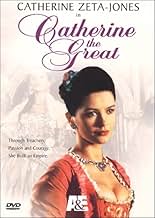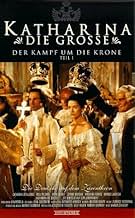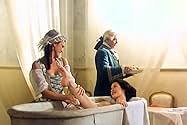VALUTAZIONE IMDb
6,1/10
1379
LA TUA VALUTAZIONE
Aggiungi una trama nella tua linguaTrapped in a loveless arranged marriage to the immature future Czar, a young German Princess proves a skillful political infighter and rises to become Catherine the Great.Trapped in a loveless arranged marriage to the immature future Czar, a young German Princess proves a skillful political infighter and rises to become Catherine the Great.Trapped in a loveless arranged marriage to the immature future Czar, a young German Princess proves a skillful political infighter and rises to become Catherine the Great.
- Regia
- Sceneggiatura
- Star
- Premi
- 1 vittoria in totale
Recensioni in evidenza
This historical drama has a most interesting story. Catherine The Great was a powerful women and she brought Russia into the modern age.
Catherine Zeta-Jones is terrific in this film. She plays the part well expressing the independence and greatfulness of Catherine The Great. Highly recommended.
Catherine Zeta-Jones is terrific in this film. She plays the part well expressing the independence and greatfulness of Catherine The Great. Highly recommended.
The Empress Elizabeth II rules mid-eighteenth century Russia. She marries her heir, the physically impotent German prince Peter, to the German princess, Catherine (Catherine Zeta-Jones). Catherine takes a lover, bears a child, plots against her husband and deposes him after he has reigned only six months. She becomes the Empress Catherine II. Well-educated and with liberal ideas, she is an astute politician and wages war with success. Yet when rebellion confronts her with the choice between fostering freedom and suppressing rebellion, she chooses suppression.
Catherine II was a fascinating and complex ruler, the period was crucial in determining the future course of Russia, its expansionary empire, its reactionary society and primitive economy. This film, however, addresses none of these great themes, except in the most cursory and superficial manner. It is a shallow drama of empty spectacle, in which intimate diversions are followed by unconvincing public events, battles and rebellions. The psychological characteristics of the protagonists, the motivations that drive them, the reasons for their decisions are all left unexplained. "There are great matters at stake", says Catherine to Potyomkin (Paul McGann), but we are never told what they are. Such rationalizations as do emerge involve the anachronistic importation of late twentieth-century western liberal concerns into eighteenth-century Russian society.
Television drama need not seem cheap. This film does. There is a good cast, but the dialogue is empty and its delivery perfunctory, although Ian Richardson's Vorontsov is done well and Brian Blessed is surprisingly well-moduated (and exceptionally quiet) as Bestuzhev. Generally, the cast seems dispirited by the trite, thin, lines they are asked to utter. One hundred minutes spent watching Miss Zeta-Jones will always have its rewards. None the less, she is miscast. Most particularly, her voice is in its nature contemporary and middle class, with its very modern inability correctly to pronounce the letter 'r'; it is unsuitable to the role of an eighteenth century aristocrat and Empress. The set pieces are sparse and unconvincing and the direction humdrum.
The story and this cast deserved better than this slight spectacle.
Catherine II was a fascinating and complex ruler, the period was crucial in determining the future course of Russia, its expansionary empire, its reactionary society and primitive economy. This film, however, addresses none of these great themes, except in the most cursory and superficial manner. It is a shallow drama of empty spectacle, in which intimate diversions are followed by unconvincing public events, battles and rebellions. The psychological characteristics of the protagonists, the motivations that drive them, the reasons for their decisions are all left unexplained. "There are great matters at stake", says Catherine to Potyomkin (Paul McGann), but we are never told what they are. Such rationalizations as do emerge involve the anachronistic importation of late twentieth-century western liberal concerns into eighteenth-century Russian society.
Television drama need not seem cheap. This film does. There is a good cast, but the dialogue is empty and its delivery perfunctory, although Ian Richardson's Vorontsov is done well and Brian Blessed is surprisingly well-moduated (and exceptionally quiet) as Bestuzhev. Generally, the cast seems dispirited by the trite, thin, lines they are asked to utter. One hundred minutes spent watching Miss Zeta-Jones will always have its rewards. None the less, she is miscast. Most particularly, her voice is in its nature contemporary and middle class, with its very modern inability correctly to pronounce the letter 'r'; it is unsuitable to the role of an eighteenth century aristocrat and Empress. The set pieces are sparse and unconvincing and the direction humdrum.
The story and this cast deserved better than this slight spectacle.
Having read the other comments on this film (by the way, I saw the 180 minute TV version), it seems to be the general opinion that Catherine Zeta-Jones was excellent. I beg to differ. Not one moment was there in the entire movie where I felt she was the protagonist, as she was supposed to be. If the real Catherine did do things that earned her the nickname "the Great", they were kept out of this movie. Going to extreme lengths to avoid one inch of her body being seen during one of the many nude scenes (then why play them at all?), Zeta-Jones never convinces as a woman of the world, a strong character, able to stand up to her mother-in-law (played brilliantly by Jeanne Moreau), and toying with the emotions of every man around. Instead she is an ice queen. No warmth, no passion, no sincerity. On the other hand, the movie has many fine performances. Ian Richardson, Brian Blessed, John Rhys-Davies (yes, he is well-cast as a violent peasant-soldier), Tim McInnerny as Iwan, aka prisoner number one. And production is beautiful, just look at Catherine's diamonds. They sparkle whereas their wearer doesn't. Does this movie enlighten the viewer about an important era in Russian history? No, but that would be asking a bit much in so little time. But it does tell a story quite entertainingly. Alas, as with many international productions, some people are simply miscast... All in all, 3 out of 4.
This movie is a good example of how to make a movie about foreign royalty: good acting, a little drama, some good action, and some interesting sidelines. Catherine Zeta-Jones is great in one of her first major roles as the Russian queen, Catherine (Katharina) the Great. There are also some other actors unknown to me who do a good job at portraying how she affected people and what she was like. Though the movie seemed to drag on at different points it still kept you interested. If you've got about four hours on your hands go out and rent it or watch it on T.V. It would probably be good to show to students when studying that point in history, maybe.
8/10
8/10
Although fairly interesting to watch, Katharina is very historically inaccurate and biased, which is partly due to the horrible miscasting. Just to name a few: 1. Catherine Zeta-Jones as Empress Catherine II: a actress who is young, beautiful, dark in complexion and extremely attractive is certainly a poor choice to play a pale, plain middle-aged nimphomaniac. No one would ever address the real Catherine II as "you pretty thing", as Pugachev did in the film! 2. Jeanne Moreau as Empress Elizabeth: a 70-year old playing a 40-year old (I think this is self-explanatory) 3. Omar Sharif as Count Razumovsky: a 65-year old with a typically mediterranean appearance as a 45-year-old Ukrainian... 4. Rhys-Meyers as Pugachev... Don't know where to start... Apart from the fact that the actor is once again much older that his character, Rhys-Meyers is a BAD choice to play a violent, charismatic, almost demonic, and at the same time very folkish, Emelian Pugachev. Rhys-Meyers just doesn't look like an escaped convict-mass-murdered-highway robber-impostor or any of what real-life Pugachev was. Apart from that, a particularly striking misportrayal is the execution of Pugachev. The filmmakers have it take place in the summer in front of a crowd of about 5, while in reality it took place in the middle of winter on the Red Square in Moscow in front of a crowd of perhaps a 100,000, and was an extremely dramatic event, one the biggest public spectacles in Russia's history. So much for the fillmakers... Also, the story of Catherine's marriage to Peter III is portarayed in a highly prejudiced manner, drawing an all-too-clear line between the supposedly "good guys" (namely Catherine, Orlov, and the bunch) an the "horrible monster" Peter III. The story was not nearly so black-and-white in reality. Apart from that, the film makes fairly decent viewing. Balancing the two, I give it a 6/10
Lo sapevi?
- QuizJeanne Moreau (Elizabeth) played Catherine in Great Catherine (1969).
- BlooperWhen Catherine trades in her virginity to get pregnant, the skin of her mate's back and legs is tanned, while his buttocks are perfectly white. There were neither sunbathing nor a pair of trunks in 18th century.
- Versioni alternativeApprox. 80 minutes were deleted from the US version by A&E compared to the original German version which was shown in 2 parts a 90 minutes.
- ConnessioniFeatured in Neighbours: A 10th Anniversary Celebration (1995)
I più visti
Accedi per valutare e creare un elenco di titoli salvati per ottenere consigli personalizzati
Dettagli
- Data di uscita
- Paesi di origine
- Lingua
- Celebre anche come
- Catherine the Great
- Luoghi delle riprese
- Aziende produttrici
- Vedi altri crediti dell’azienda su IMDbPro
- Tempo di esecuzione
- 1h 40min(100 min)
- Mix di suoni
- Proporzioni
- 1.33 : 1
Contribuisci a questa pagina
Suggerisci una modifica o aggiungi i contenuti mancanti

























